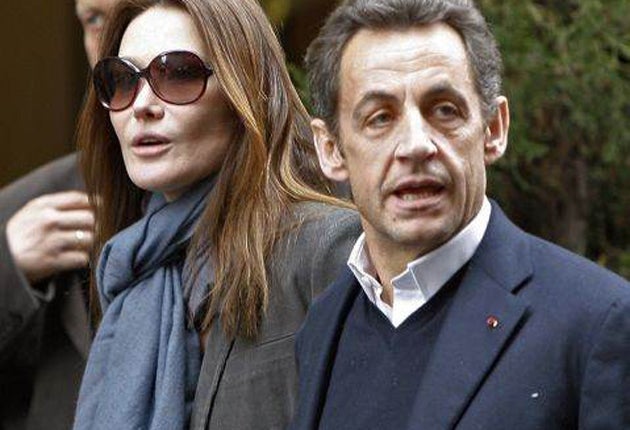Revolt over Sarkozy's tax plans puts his future in doubt
Approval ratings hit an all-time low as President accused of pandering to rich

President Nicolas Sarkozy faced a damaging head-on challenge from within his own party yesterday as his standing in opinion polls fell below 30 per cent for the first time.
Thirteen parliamentarians from the President's centre-right party moved to scrap Mr Sarkozy's first and proudest "reform": a law which guarantees that no one in France should pay more than 50 per cent in direct taxes.
The Elysée Palace insisted there was no chance of a U-turn on a policy that has come to symbolise his erratic attempts to roll back the state. But the challenge from within his own party is also deeply symbolic. The President's once seemingly unassailable grip on the centre right has been seriously weakened by a humiliating defeat in mid-term regional elections last month.
The Paris political village is buzzing with reports that Mr Sarkozy may decide not to run for a second term in 2012. According to one source, his closest aides are speculating that frustration, or ill health, or the repeatedly voiced wishes of his wife, Carla Bruni Sarkozy, may persuade him to retire in two years' time at the relatively early age (for French politics) of 57.
Other centre-right sources – and the President himself – insist that he is determined to fight on. He hopes to rebuild his domestic standing through hyperactivity on the international stage, starting with his visit to Washington earlier this week and continuing with France's G8 and G20 presidency next year.
He will be starting from a low base. A poll to be published in Le Figaro magazine tomorrow, puts his approval rating at 28 per cent – his lowest ever.
Two previous presidents, François Mitterrand and Jacques Chirac, sank even lower but both managed to retain the core support of their own parties. Mr Sarkozy is in danger of losing control of the Union pour un Mouvement Populaire (UMP), which he snatched from Mr Chirac in 2005-06.
"In truth, Sarkozy has never had many true loyalists in the UMP parliamentary party, maybe 30 [out of 315]," one source said yesterday. "He hijacked the party by persuading everyone that he, and he alone, could bring them success."
On Wednesday night, Mr Sarkozy addressed his parliamentary troops. He begged them to remain loyal to his reform programme and, in particular, not to campaign against his 50 per cent ceiling on direct taxes.
The so-called "bouclier fiscal" was pushed through within weeks of Mr Sarkozy coming to office in May 2007. The tax ceiling was the emblem of his campaign promises to make France "work harder and earn more"; to "break the French taboo on making money"; and to create a "shock of confidence" which would boost the French economy.
It was dismissed by left-wing opponents as a concession to Mr Sarkozy's wealthy friends in the media, business and advertising. The loss in revenue hamstrung other policies. The "shock" of growth failed to appear.
Now that France is struggling with a deficit of almost 8 per cent, many of Mr Sarkozy's allies say that the tax shield must go. Although it loses the French state only €500m (£443m) to €600m a year, the symbolism of the shield has become disastrous. Any increase in direct taxes to reduce the deficit would fall on poor and middling earners. The rich would pay no more.
Thirteen parliamentary members of the UMP signed a comment article in Le Monde yesterday saying that they planned to table a draft law to scrap the bouclier fiscal. Only by making the rich share the pain of tax rises and spending cuts, could the government "give a new sense of purpose to a country which is becoming dangerously fragile and divided," the deputies said.
To lose the government majority in the national assembly it would need around 50 UMP and allied deputies to change sides. On the "tax shield", such a rebellion is no longer unthinkable.
European leaders: Growing pains
* Angela Merkel's standing with the German electorate has slumped to a four-year low because of infighting in her coalition. A poll for the ARD TV yesterday showed the Chancellor's personal popularity down seven points in the last month to 55 per cent.
* Spain's José Luis Rodriguez Zapatero has grown increasingly unpopular since he announced austerity plans to contain the deficit, including pension reforms. The latest poll for El Pais showed 76 per cent of people did not trust the premier, up eight points from the previous month.
* Although Italian Prime Minister Silvio Berlusconi escaped total humiliation in last weekend's regional elections, his personal approval ratings are at an all-time low of 44 per cent.
Subscribe to Independent Premium to bookmark this article
Want to bookmark your favourite articles and stories to read or reference later? Start your Independent Premium subscription today.

Join our commenting forum
Join thought-provoking conversations, follow other Independent readers and see their replies